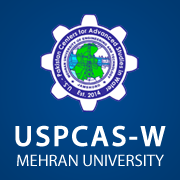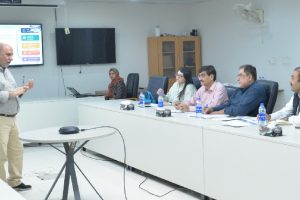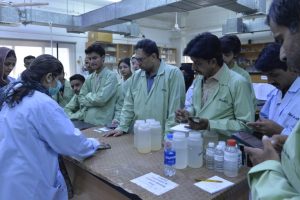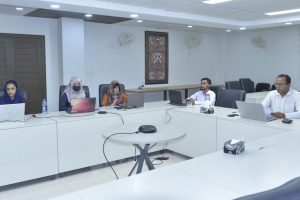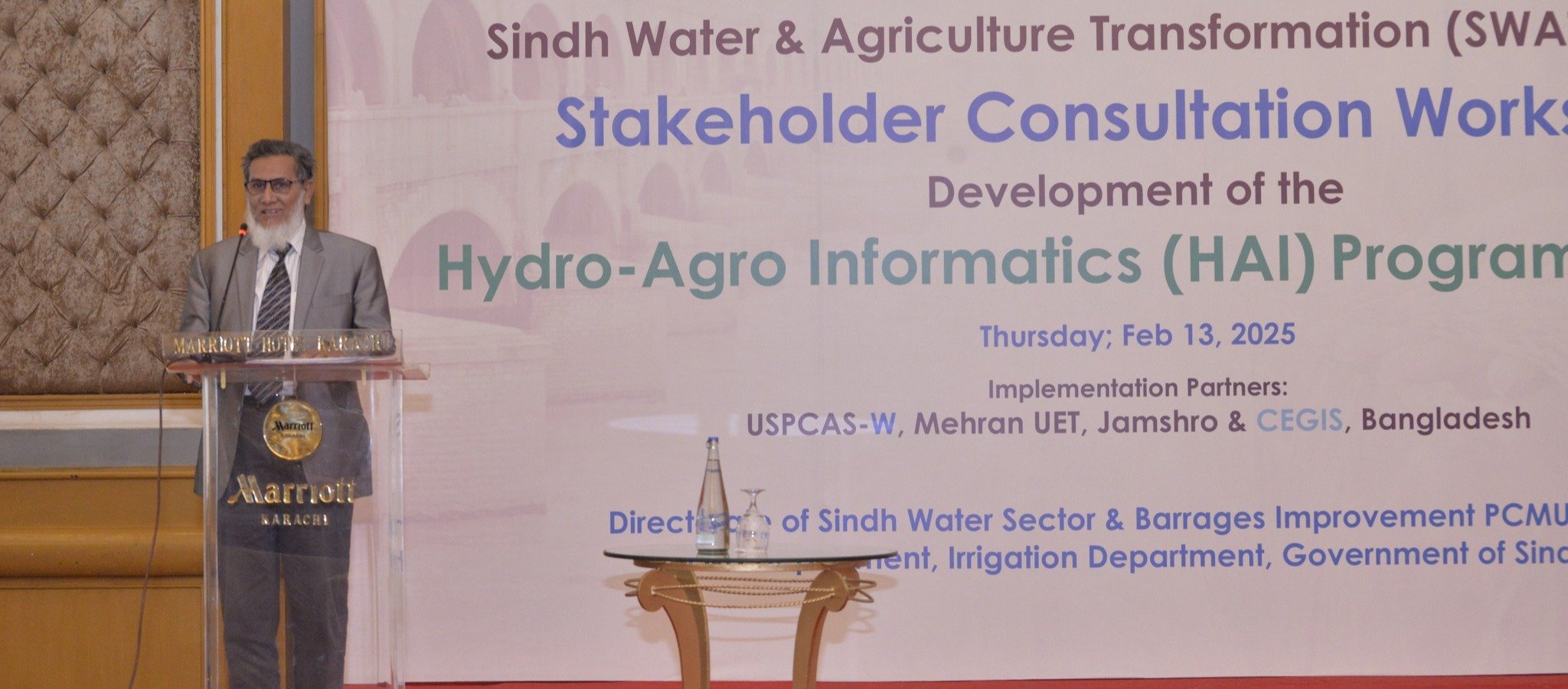
USPCAS-W Hosts Stakeholder Consultation Workshop for Hydro-Agro Informatics Program (Phase-I) under SWAT Project
The U.S.-Pakistan Center for Advanced Studies in Water (USPCAS-W) at Mehran University of Engineering and Technology (MUET), in collaboration with Directorate of Sindh Water Sector & Barrages Improvement (PCMU), Planning and Development Department and Sindh Irrigation Department, Government of Sindh successfully organized a Stakeholder Consultation Workshop for the development of the Hydro-Agro Informatics (HAI) Program (Phase-I) under the Sindh Water and Agriculture Transformation (SWAT) Project. The event brought together key stakeholders from government departments, research institutions, NGOs, and agricultural organizations to collaborate on modernizing water and agricultural management in Sindh.
The workshop aimed to share findings from the gap and needs assessment for the HAI program. Validating identified gaps, prioritizing actionable steps, strengthening partnerships, and fostering stakeholder collaboration to implement the HAI program successfully.
Mr. Nazir Ahmed Memon, Project Coordinator, PCMU, SWAT, P&D Department, welcomed the participants and highlighted the importance of the HAI program in transforming water and agricultural practices in Sindh.
Ms. Florence Rolle, the FAO Representative for Pakistan, emphasized the role of data-driven decision-making in addressing water and farming challenges. She commended the SWAT project for its innovative approach to sustainable resource management.
Prof. Dr. Kamran Ansari, Director of USPCAS-W, presented the framework and objectives of the HAI program. He highlighted the integration of remote sensing, ground-based monitoring, and data analytics to improve water allocation and agricultural productivity. Mr. Mutalib Sarkar, Deputy Executive Director of CEGIS, Bangladesh, shared valuable insights from Bangladesh’s experience in water resource management and how similar strategies could be applied in Sindh.
Mr. Sajjad Hussain Abbasi, Secretary of the Planning and Development, Government of Sindh, highlighted the importance of stakeholder collaboration and the role of the HAI program in achieving sustainable development goals. Mr Idrees Khan, Additional Secretary of the Agriculture Department, Government of Sindh, discussed the critical need for modernizing irrigation practices and improving agricultural productivity through advanced technologies. Mr. Pritam Das, Managing Director of the Sindh Irrigation & Drainage Authority (SIDA), shared insights on the irrigation sector’s challenges and the HAI program’s potential to address these issues effectively. Prof. Dr. Altaf Siyal, Vice Chancellor of Sindh Agriculture University (SAU), provided valuable suggestions for the HAI program. He emphasized integrating advanced technologies, stakeholder engagement, and capacity building to ensure the program’s success.
Prof. Dr Fateh Mohammad Marri summarized the key discussions, feedback, and recommendations from the workshop. He expressed gratitude to all participants for their active engagement and valuable contributions. Dr. Marri emphasized the importance of continued collaboration among stakeholders to ensure the successful design and implementation of the HAI program. He also highlighted the need for a unified approach to address Sindh’s water and agricultural management challenges.
The workshop concluded with A validated gap and needs assessment report. A prioritized action plan for addressing key challenges. Strengthened partnerships and a shared vision for the next steps in designing and implementing the HAI program.
Dr Rafiq Chandio, DG, Bureau of Statistics Sindh, Mr Shahid Panhwar, M&E Specialist, SPHF and a diverse group of experts from various sectors attended the workshop, including the Sindh Irrigation Department, Agriculture Department and other Government Departments, academia, research institutions, NGOs, and irrigation and agricultural organizations. Participants actively engaged in discussions, sharing their expertise and insights to address key water and agricultural management challenges. The event concluded with an interactive Q&A session, where stakeholders raised questions, exchanged ideas, and collaboratively explored solutions for successfully implementing the Hydro-Agro Informatics (HAI) Program. This interactive dialogue ensured that all perspectives were considered, fostering a sense of shared responsibility and commitment to the program’s goals.

